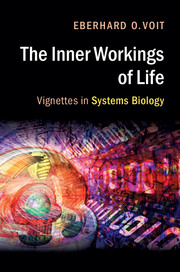Book contents
- Frontmatter
- Contents
- Appetizer
- Acknowledgments
- 1 Status: it's complicated!
- 2 I'd rather be fishin’
- 3 Whizzes and apparitions
- 4 Why?
- 5 Simply engenious!
- 6 Just a little bit
- 7 Supermodels
- 8 Close only counts in horseshoes and hand grenades
- 9 Emergence preparedness
- 10 Life without chaos?
- 11 What hath God wrought!
- 12 Tell me with whom you go and I'll tell you who you are
- 13 Time for a change!
- 14 Can't we all get along?
- 15 Love thyself and fight all others
- 16 A billion dollars for your thoughts!
- 17 The computer will see you now…
- 18 Redesigning perfect
- 19 Let's meet in the agorá!
- 20 Dessert
- Gentle jargon
- Selected further reading
- Index
10 - Life without chaos?
Published online by Cambridge University Press: 05 May 2016
- Frontmatter
- Contents
- Appetizer
- Acknowledgments
- 1 Status: it's complicated!
- 2 I'd rather be fishin’
- 3 Whizzes and apparitions
- 4 Why?
- 5 Simply engenious!
- 6 Just a little bit
- 7 Supermodels
- 8 Close only counts in horseshoes and hand grenades
- 9 Emergence preparedness
- 10 Life without chaos?
- 11 What hath God wrought!
- 12 Tell me with whom you go and I'll tell you who you are
- 13 Time for a change!
- 14 Can't we all get along?
- 15 Love thyself and fight all others
- 16 A billion dollars for your thoughts!
- 17 The computer will see you now…
- 18 Redesigning perfect
- 19 Let's meet in the agorá!
- 20 Dessert
- Gentle jargon
- Selected further reading
- Index
Summary
We all use thermostats, shock absorbers, and various kinds of insurance to buffer our life against strong fluctuations. Yet, if two kids are sick, the dog just ran away, the car has a flat tire, and we are late for work anyway, life is just chaotic. Is it even possible that there is normal life without chaos? If we could ask the Greek theologian and philosopher Hesiod, who lived in about 700 bc, he would have insisted without doubt on the utmost importance of chaos. After all, Chaos was a primeval deity that existed before all the others and gave birth to Love, Silence, and the Night. Allegedly, Chaos even preceded the gods responsible for the underworld and for Earth itself. Chaos was imagined as the gap of total emptiness between heaven and Earth, from which the cosmos was later created. This vision was actually not all that different from the Judeo-Christian version of the beginnings of the earth, which initially was tohu wa bohu: without form and void.
Today, the notion of chaos is rather different. In the vernacular, it refers to disorder or confusion, mayhem and unpredictability. In math, and by extension in the theory of dynamical systems and in systems biology, chaos has been given a much more specific and narrow definition. Namely, it describes the behavior of a system that follows deterministic rules but nonetheless seems to be unpredictable and random. Is chaos possible in biological systems and does it play a significant, positive or negative, role?
To appreciate the definition of modern-day chaos in dynamical systems, one needs to start a little earlier and look at random, stochastic effects, and deterministic processes. A first question, which sounds innocuous but really isn't, is whether there is true randomness. We often associate randomness with a lottery or with betting games, such as flipping a coin, rolling the dice or playing roulette. We call the outcomes of these games random, because we simply cannot predict them, no matter how long we play. At the same time, some aspects are not entirely unpredictable. For instance, if we flip a fair coin 1,000 times, we expect that we should see about 500 heads and 500 tails. If we roll a single die 6,000 times, we expect to find each of the 6 faces roughly 1,000 times.
- Type
- Chapter
- Information
- The Inner Workings of LifeVignettes in Systems Biology, pp. 75 - 81Publisher: Cambridge University PressPrint publication year: 2016



